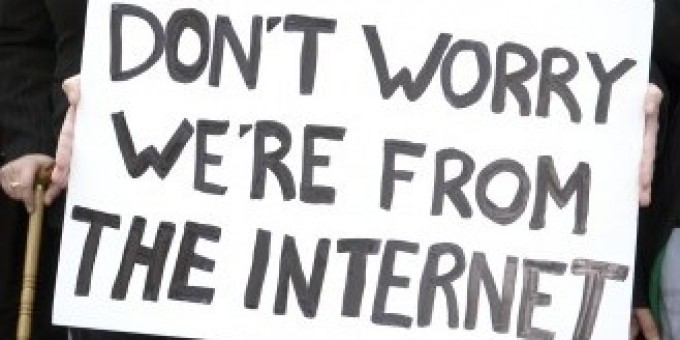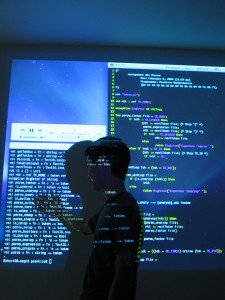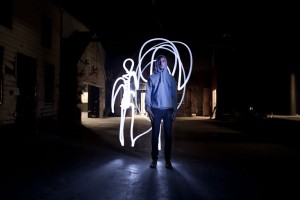
The word “anonymous” has come to mean more than a solitary, unknown person. Now, it gets capitalized—Anonymous—and it’s recognized as a loosely connected collective of hackers, activists, and Internet “trolls.” Together, this disparate group is affecting global politics, influencing off-line activism, and becoming a legitimate news source. The Guy Fawkes masks its adherents use as an online symbol and a real-life mask are well-known, associated with a sort of clandestine “Robin Hood” movement to, ironically, unmask the murky doings of government, wealth, and corporations. The Society Pages turned to Gabriella Coleman, author of Coding Freedom: The Aesthetics and Ethics of Hacking, for more insight into the activism of Anonymous, how people make use of the online space, as well as how the group is portrayed in the media and even scapegoated by governments.
Kyle Green: In your research, you discuss a number of Internet-based collectives, including 4chan and Anonymous. What is Anonymous and what does it have to do with a website like 4chan?
Gabriella Coleman: Anonymous is many different things. Currently it’s most famous for engaging in protest activity online, though not exclusively online. They have their roots, though, on this image board called 4chan… a site that allows for unfettered discussion. Much of it is topic-based; there’s different forums related to things like fitness and travel. But there’s one forum in particular, /b/, which is a forum that encourages anything and everything.
[That is] where the current idea, the current manifestation of Anonymous was born. And one of the interesting things about 4chan is that you post anonymously, and this kind of helped solidify an existing ethic that is very committed to anonymous speech and political organizing. But for many years the name [Anonymous] was used simply for trolling and Internet pranking.
KG: What do you mean by “trolling?”

GC: [Trolling] can mean many different things; it’s a number of activities where you’re being purposefully provocative to get a reaction from someone else. And that might mean something kind of mundane, like using offensive funny language, to more coordinated acts of trolling where people are targeted and humiliated beyond belief.
[Th]e name Anonymous, with a certain iconography, headless man, and jargon was used to kind of troll individuals online and offline. And then lo and behold, in 2008, there was an interesting metamorphosis where the name was also used to engage in activism.
KG: So there was not as much overt political activity before 2008?
GC: There were these very incipient moments where, for example, a racist radio personality, Hal Turner, was targeted. And he was targeted in an act of trolling, but because he was a kind of racist radio personality, people saw the politics involved and I think also saw the potential for their own power. But I think it wasn’t really until 2008 where the transformation was really secured. And post-2008… different individuals started to take the name and the mantle to create different networks and nodes to organize politically. So [Anonymous] not only transformed, it sprouted many heads post-2008.
KG: When you started your research, were you already well versed in a lot of the Internet slang or did you have to pick it up as you went along so that you could become more of a part of the group?
GC: You know, I knew some, and Anonymous is interesting because it has elements of open source culture. [P]eople use open source software to run these IRC servers, and many people are committed to Linux which is an open source server. And then there’s, of course, the kind of cultural motifs and jokes that come from 4chan and other message boards I was familiar with… And then there was just like the Anonymous stuff going on, like the internal politics—Who’s who? What are they doing? And that I got a good sense of, but they are kind of cloaked in a considerable degree of mystery and secrecy, so it isn’t like I got total insight into everything that was going on.
KG: Were you able to get a sense of who actually makes up this group? Do they fit that stereotype of, I don’t know, the white guy sitting at home in his parents’ basement?
GC: … I met enough to say that “Wow, I’m kind of amazed at the diversity within Anonymous.” I mean it’s not total diversity, it may not be the rainbow nation or something like that, but it’s not simply white, young males. There are a lot of males, especially in Anon Ops, Chanology was much more evenly divided between females and males. There were people from kind of many, many different ethnic backgrounds. There was, or is, I’m actually not sure about currently, but there was a very active queer community in Anon Ops. Class-wise [there’s] also more diversity than you might think.

[A]nother really important point is that when I studied open source, almost everyone involved was kind of skilled technically, either as a programmer, assistant administrator, [or] net administrator. In Anonymous, …not everyone contributing is technically skilled at all. It’s much more open and participatory, it’s one of the reasons why it’s scaled, it’s the reason why so many people feel comfortable there. And people bring many skills; sometimes it’s video editing or design—those are very, very important. Just participating by organizing…
KG: Is there a pretty big age range of participation as well?
GC: [I]t’s definitely a youth movement, where by “youth” I mean …from teenagehood to roughly 35. That tends to be the spectrum. There’s definitely some folks who are older, but that’s the spectrum.
KG: It always amazes me when someone who’s 14 or 15 years old and yet, they can’t even drive or vote yet, but they manage to break the security of a major credit card company or bring down some government organization even temporarily.
GC: No, that’s true. And you know a lot of people who are hackers acquired their skills from a very young age and that’s one of the things in the book I just published—I have kind of a life history of free software developers and open source developers. And many of them learn technical skills as young as three (that was a little bit rare), but between six and ten years old.
KG: What makes the current incarnation of Internet collectives different from past community forums? Is this just the natural progression?
GC: Well, when it comes to open source, it’s not something that simply happens online. …[G]eeks and hackers tend to congregate in major cities like San Paolo or Sydney or San Francisco. They live together, they work together, they marry. They hang out online, they see each other frequently in a kind of mundane way, they go to developer conferences. Currently there’s a very big conference in Germany, the Computer Chaos Club… a lot of hackers go and there’s actually a lot of people from Anonymous who go as well, but they’re not going to be public about it.
So, open source really fuses the offline and online, and it’s one of the reasons why it’s such a kind of robust world of technical production, of identity production. Anonymous, again, is very unusual, especially the networks that engage in illegal activity, because they can’t really meet in person as much. People do become friends, …but they have to protect themselves and it creates some very difficult kind of conditions.
[The] kind of large-scale protest activity we see with Anonymous that is organized primarily online is not unprecedented; this has been happening ever since the web has existed. But at this scale, richness, and depth, it is kind of new. And it’s also interesting because, while Anonymous isn’t pure chaos—it’s got its logics and stabilities—[but the aim of anonymity] does prevent forms of routinization and institutionalization that you see, for example, with open source software…KG: What is the build up like before an operation takes place? Is there some sort of community discussion, does someone just take a lead, what actually happens?
GC: Every operation is different… but there’s only really a handful of possible scenarios. So, in the scenario where you have doxxing, the identification and revelation of an individual, it’s usually only a few people who take that initiative… It can’t happen publicly because… in some cases it’s just flat out illegal, in other cases [it] would spark a lot of controversy within Anonymous.
In some instances someone does propose a kind of idea. This happened with Operation Payback, the second one in support of WikiLeaks, when MasterCard and other financial services pulled the plug. It was really one person who kind of, I think, tweeted something, started talking on IRC, [then] people with Botnets, …kind of compromised computers that really help with a Distributed Denial of Service attack [wherein a website is taken down by a coordinated attack by many computers whose traffic actually overwhelms the site’s server], started to get involved. But so many people were supportive … [it] was a very classic example of something where an idea is proposed and everyone jumps aboard.

Operation Bart is another great example …in San Francisco, the Bay Area Rapid Transit was going to shut off cell phone access in the stations to thwart protests against police brutality. Anonymous got wind of this, started to produce videos, an IRC channel, and it got a wellspring of support, so much that they even did street protests. So, it’s just kind of different in every case, but definitely when it’s full-on illegal, it tends to happen behind the proverbial closed doors… in secret IRC channels or among a few people who are communicating securely.
KG: So, we’ve talked a lot about operations that seem political—should Anonymous be understood as a political entity?
GC: I think it should. And obviously the name can be used for different purposes, although I will say since 2008, but especially since 2010, it’s been used pretty much exclusively for activist operations. People may not always agree with the nature of the operation, but the trolling campaigns, for reasons that are not even entirely clear to me, have kind of waned. So, there have been activist operations, political operations (again, some controversial because they pertain to or use doxxing or hacking tactics)… they’re tapping into some deeper disenchantments, and people are using the mantle to engage in activist causes.
KG: I’ve been fascinated at the people who have basically no interest in the Internet who hold up Anonymous as some sort of gold standard for political organizing.
GC: Yeah, I think they became a symbol of movement. In the most potent one, where while there’s people, certainly, who have more influence and power, their whole iconography, their whole ethics, it’s built on this premise of keeping hierarchy at bay, not having a leader. Occupy Wall Street was really committed to that, so it became kind of a handy symbol to adopt for that precise reason. And perhaps, it sounds a little bit cheesy, but [Anonymous became] a kind of symbol for hope, political protest, expressing dismay over the political condition…KG: You talk about the importance of comedy and how central it is to these groups; how does that relate to the political?
GC: In Coding Freedom, my ethnography of free software developers, I was just struck at how important humor was. It was just so abundant in this world, from conversation to the level of software and code, where what’s called “Easter eggs,” little hidden jokes, are placed inside for you to find. And I have a whole chapter trying to understand how humor relates to the hacker habitat and what it says about their commitments to cleverness and individuality. Anonymous also has a lot of humor… more irreverent, far more grotesque, far more offensive.
KG: That definitely won’t surprise anyone who’s visited 4chan!
GC: Exactly, it comes from the world of trolling… [and] a commitment to “anything goes”… speech. It’s loud, it’s crass, it can be very funny at times, too, it’s just not always as elegant. And it matters quite a bit… it’s part of their historical identity, it points to the conditions of their birth. It’s also important for kind of in-house group membership… [W]hen you don’t have to do anything but say you’re Anonymous, things like humor are particularly powerful forces that bind a group together. And finally, and this pertains to many different arenas of politics, but political activity can, frankly, be extremely depressing, disenchanting. There’s a lot of losses, there’s not a lot of gains, and humor helps to keep the spirit a little bit more buoyant…
KG: Does humor also attract more attention to the various operations?
GC: [It] definitely can. One of the most famous ones was Operation HBGary, which was a kind of retaliation against a security firm and researcher Aaron Barr, who claimed he had infiltrated Anonymous and was going to hand over names of key operatives to the FBI. [Anonymous] … gutted his company servers, deleted backups, downloaded e-mails, and on IRC, on Twitter, they hacked [in] and were spewing very offensive, sometimes very funny, messages. It got a heck of a lot of attention, you know? People were just so collectively enthused by it. But unlike groups like The Yes Men who really use humor in this fine-tuned manner, Anonymous isn’t always so fine-tuned… if you’re not part of this world you don’t always totally get it.
KG: Did you see there being other uniting political principles outside of the goal of freedom of expression and freedom of the use of Internet?
GC: Yeah. I mean, it’s elastic… definitely there are bread-and-butter issues, like censorship, privacy, and surveillance encryption that really get their goat. And that’s where you get the largest number of participants showing a kind of support or actually getting involved. And it doesn’t surprise me; they’re from the Internet, they’re of the Internet, they’re going to protect the Internet. …I think some of the international operations in the Philippines, in India, in Romania really give sense of how far and wide Anonymous can travel.
KG: Is there any barrier for entry to the group? I mean, could someone simply go and engage in an Internet-based action and say “This was the work of Anonymous?”
GC: On the one hand, you know, there’s strength in numbers and strength in stability. So there’s existing networks and you can contribute to them, anyone can show up. Now, if you’ve never been on Internet relay chat before, if you’ve never participated in the kind of culture of Internet joking and memes, you’re less likely to show up, right? It’s a kind of cultural capacity sort of argument: …we have certain capacities and experiences and that will take us down certain paths and not others …And yet, compared to something like open source, which I studied quite deeply, I dedicated a chapter to a free software project that takes up to a year to join. …You’re tested, you go through these membership procedures, you’re vetted technically, and you have to write essays about your philosophy. It’s just like a whole different sort of world [with Anonymous]. It has that kind of flexibility built in—elasticity and openness, and yet cultural capacities and experiences are going to obviously limit who is going to show up to some degree.
KG: How does the government treat or react to such groups—Anonymous in particular?

GC: Big fans, they love it! [Laughs] They’re not the hugest fans in the world.
I mean, it’s different in different places. The United States has a history of criminalizing the DDoS …attack under all circumstances…. In Europe it’s not so heavily criminalized, and there’s also some places, like Germany, that have pointed to the possibility of seeing it as kind of protest activity. [But] there have been major arrests across the Western world, from Romania to the Dominican Republic… to Chile to the United States, over DDoS, over the hacking. I think it is kind of a threatening activity in the sense that, you know, while geeks and hackers require either cultural background or technical skills and capacities, there’s a heck of a lot of them in the world. …They’re employed by corporations, by governments, by non-profits, by schools, right? And so there’s this steady flow of individuals, only a portion whom will be attracted to political activity, but all of a sudden there’s this world… [that’s] cracked down and that’s led to a number of arrests. And then finally, in the context of the United States, there’s also been informants… any kind of radical activist group will likely at some point be infiltrated.
KG: In some of your popular writing you’re critical of the way the media has characterized Anonymous. What’s lacking or unsatisfactory?
GC: To me, there’s three elements I’m a little unsatisfied with. One is that Anonymous is primarily about hacking and hackers. It is certainly the case that the hacking gets the most media attention…, but again what’s so interesting about Anonymous is how it isn’t these small hacker collectives, though there’s small hacker collectives within Anonymous. It’s just so much bigger than that… that it’s not limited to [hacking] is part of its strength…
The second concerns its kind of amorphousness. …Sometimes you read these reports and you think that… [Anonymous is] just completely impossible to find. And even those journalists who have talked to [some of the hackers] describe some of their places of interaction, like IRC, as the “deep web.” It’s not deep, it’s very easy to find. And there is this kind of sociological stability to [Anonymous]. It’s still a stability that is very difficult to map, you’re never going to be fully comprehensive, and it takes a heck of a lot of time to really get to know them, but it is possible, and much easier than certain criminal groups who do everything possible to remain fully hidden.
And then thirdly, some folks have, I think, rightly noted that the government is going to use the example of hacktivism or Anonymous to justify greater legislative controls regarding things like surveillance. That I can’t argue with, my only point in response to that is that if Anonymous never existed or vanished tomorrow we would still have those.
KG: So governments can scapegoat Anonymous for their regulations?
GC: Yeah, exactly. [But the surveillance] would happen anyway. …[T]here’s already laws in place and activities in place that we should be extremely concerned about, things are already terrible.
KG: So, is this a case where the media is simply buying into the mythology of Anonymous, good and bad?
GC: Honestly, actually I’ve been pretty impressed… with a lot of journalistic reports. I think they’ve done a pretty good job at it. The biggest [mistake] is that [Anonymous groups] tend to be described as “hackers,” but that’s often a kind of editorial decision… I think it was much worse before… Actually, almost a year ago there was a series of operations that kind of made it unmistakable that Anonymous was “about” activism. Even if it was an activism that you may not agree with, kind of irreverent and dicey, it was activism not hoodlums. And I think that changed a lot of the reporting. And then there’s a lot of reporters, such as Quinn Norton, who were really embedded, really in there, who report on it very consistently and that helps tremendously.
Comments